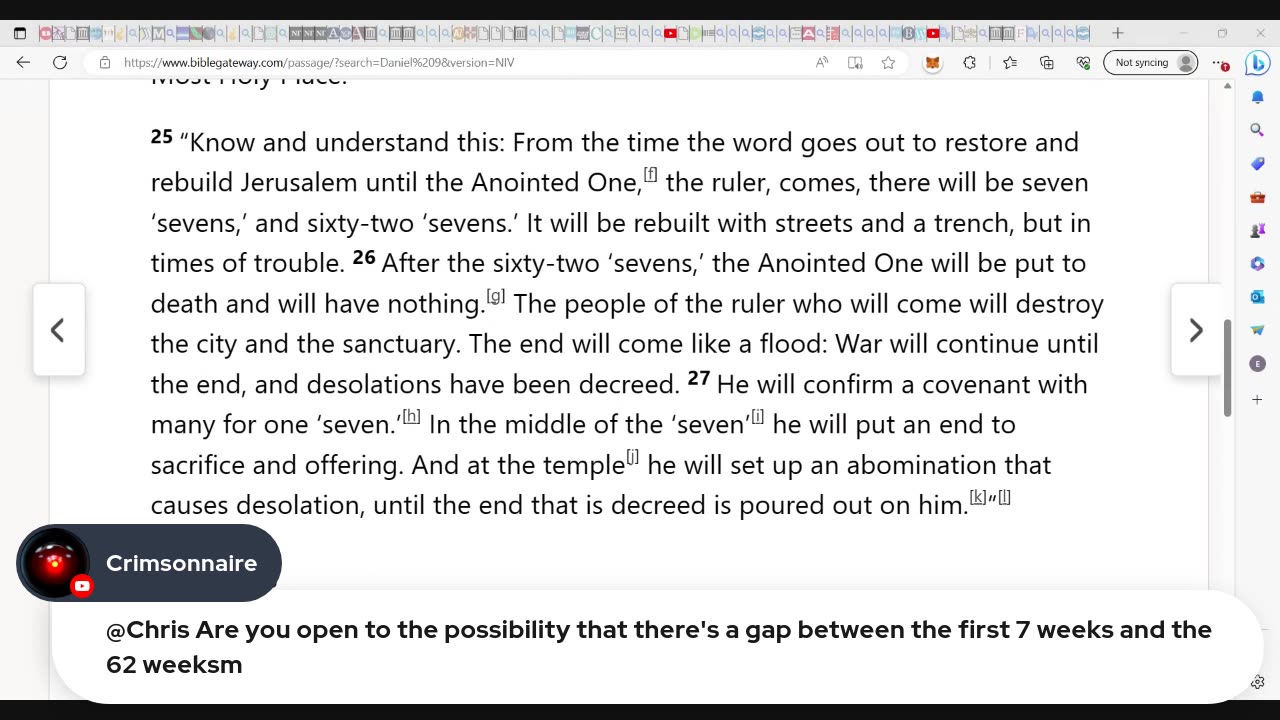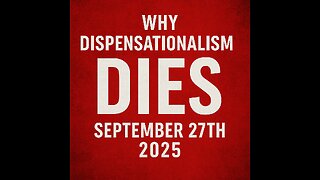Premium Only Content

2300 recalculated in Daniel 8:14 Michael Segal and Shlomo Wadler
https://brill.com/view/journals/jsj/54/2/article-p155_1.xml
According to one source, Antiochus met the Romans in Egypt in June 168 BCE, when he was confronted by the Roman envoy Gaius Popillius Laenas, who demanded that he withdraw from Egypt or face war with Rome. This happened shortly after the Romans defeated Antiochus’s ally Perseus of Macedonia at the Battle of Pydna on June 22, 168 BCE1. Another source says that Antiochus invaded Egypt again in November 168 BCE, and that he was met by the same Roman envoy, who gave him the same ultimatum. It is possible that Antiochus made two attempts to conquer Egypt in 168 BCE, and that he was turned back by the Romans both times.
I tend to think the June 22 168 date might be correct, and in the same year upon arriving in Jerusalem he took out his anger on the Jews and later started the desecration
That is a reasonable hypothesis, based on the available evidence. It is possible that Antiochus was frustrated by his failure to annex Egypt and his humiliation by the Romans, and that he vented his anger on the Jews, who were already resisting his attempts to impose Hellenism on them. It is also possible that he wanted to secure his control over Judea, which was strategically important for his empire, and that he saw the Jewish religion as a source of rebellion and disloyalty. In any case, his actions provoked a fierce resistance by the Maccabees, who eventually restored Jewish independence from the Seleucids.
if June 22 168 bc is the correct time, what might be the most reasonable date that Antiochus's forces would arrive in Jerusalem?
According to one source, the distance from Egypt to Jerusalem is *696 kilometers* or *432 miles**². Assuming that Antiochus's forces traveled by land, and that they could cover about 30 kilometers or 18 miles per day, it would take them about **23 days* to reach Jerusalem. However, this is a rough estimate, as the actual time would depend on various factors, such as the terrain, the weather, the size and speed of the army, and the possible resistance or attacks from the local population. Therefore, a more reasonable range would be between *20 and 30 days**. If Antiochus met the Romans in Egypt on June 22, 168 BCE, he could have arrived in Jerusalem sometime between **mid-July and early August* of the same year.
based on maccabees and the being a desecration for 3 years from the 15 of kislev of 168 bc to kislev 25 of 165 bc, and based on the calculations of how many sacrifices can happen in a given span of time, when would antiochus have to arrive in jerusalem in order to interupt the sacrifices in order that enough halted sacrifices adds up to 2300?
That is a complex question that requires some assumptions and calculations. Based on your previous calculations, the number of sacrifices in a regular Jewish year is 641.5, and the number of sacrifices in a Jewish leap year is 696.25. Assuming that the 3-year period from 168 BCE to 165 BCE included one leap year, the total number of sacrifices that would have been offered in that period would be:
641.5 + 696.25 + 641.5 = 1,979.25
This means that Antiochus would have to interrupt the sacrifices before the end of the 3-year period, otherwise the number of halted sacrifices would not reach 2,300. Assuming that he interrupted the sacrifices on the 15th of Kislev of 168 BCE, as recorded in Maccabees, and that he arrived in Jerusalem a few days before that, we can estimate how many sacrifices he would have prevented by that date.
The Jewish month of Kislev can start in late November or early December, depending on the lunar cycle. Assuming that it started on November 30th in 168 BCE, the 15th of Kislev would be on December 14th. This means that Antiochus would have prevented about *14 days* worth of sacrifices in the month of Kislev. The number of sacrifices in Kislev depends on the number of regular days, Sabbaths, and special days (such as Hanukkah) in that month. Assuming that there were *24 regular days**, **4 Sabbaths**, and **2 special days* (the first and last day of Hanukkah) in Kislev of 168 BCE, and using your formula of 2 offerings on a regular day and 1 offering on a Sabbath or a special day, we can calculate:
(24 * 2) + (4 * 1) + (2 * 1) = 54 daily offerings
If Antiochus prevented 14 days worth of sacrifices, he would have prevented:
14 * (54 / 30) = 25.2 daily offerings
Adding this to the total number of sacrifices that would have been offered in the 3-year period, we get:
1,979.25 + 25.2 = 2,004.45
This means that Antiochus would have to arrive in Jerusalem at least *295.55 daily offerings* before the end of the 3-year period, or about *148 days* before the 15th of Kislev of 168 BCE, in order to interrupt enough sacrifices to reach 2,300. This would be around *July or August* of 168 BCE, which is consistent with our previous estimate based on his encounter with the Romans in Egypt.
-
 3:28:54
3:28:54
The Protestant View
8 days agoWhy Dispensationalism Dies September 27th 2025
1222 -
 LIVE
LIVE
Benny Johnson
1 hour ago🚨Trump LIVE Now: Signs Executive Order ENDING Cashless Bail | Dem Cities PANIC, Which City NEXT?...
3,863 watching -
 LIVE
LIVE
The White House
2 hours agoPresident Trump Signs Executive Orders, Aug. 25, 2025
1,415 watching -
 1:01:13
1:01:13
VINCE
2 hours agoWhy Does This Mayor Enjoy Watching His City Burn? | Episode 110 - 08/25/25
55.2K44 -
 LIVE
LIVE
LFA TV
15 hours agoLFA TV ALL DAY STREAM - MONDAY 8/25/25
4,902 watching -
 LIVE
LIVE
Wendy Bell Radio
6 hours agoAGENTS OF DECEPTION
7,749 watching -
 LIVE
LIVE
Major League Fishing
3 days agoLIVE! - Fishing Clash Team Series: Challenge Cup - Day 2
157 watching -
 LIVE
LIVE
The Big Mig™
2 hours agoTop 10 GO WOKE GO BROKE
5,009 watching -
 LIVE
LIVE
Law&Crime
2 hours agoLIVE: Adelson Matriarch Murder Trial — FL v. Donna Adelson — Day 1
245 watching -
 LIVE
LIVE
JuicyJohns
2 hours ago $0.07 earned🟢#1 REBIRTH PLAYER 10.2+ KD🟢
146 watching